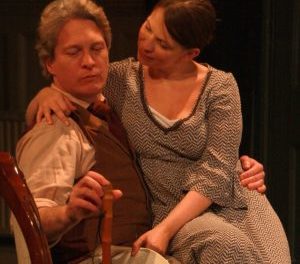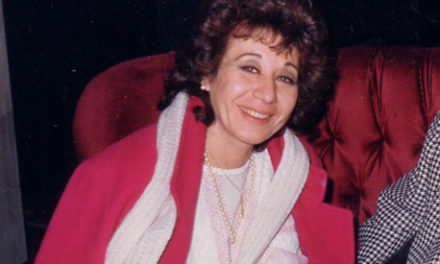In the course of her life, Elfriede Jelinek, who recently turned seventy, has written over thirty plays. They have given the German-speaking theatre not only a lot of work, but also great good fortune.
The writer Elfriede Jelinek works herself off on the world and on the German language with a “formulating hate“: thus a powerful Austrian critic once wrote with admiration of Jelinek’s work. It is therefore only logical that Jelinek’s latest play bears the title Wut (Rage). When it was premiered in Munich in April 2016, Jelinek, who was awarded the Nobel Prize for Literature in 2004 and will celebrate her seventieth birthday on 20 October 2016, declared in the programme booklet that actually she has been filled rage uninterruptedly for years. Jelinek’s enduring wrath has given the theatre world an extensive, wild, almost frightening œuvre, which has been translated into many languages.
Wut is about the Paris terrorist attacks on the editorial board of the satiric magazine Charlie Hebdo and a supermarket for kosher food. But it also tells of the foaming-mouthed protests of so-called Wutbürger, or “enraged citizens,” against foreigners or against construction projects such as the new main train station in Stuttgart, of the rage of the ancient hero Heracles and the indignation of a woman who is betrayed by her husband. In short, the text is one big hodgepodge. It resolutely mixes what often only audacious associations join together. This is typical for Jelinek’s plays. The small and great catastrophes of life, the global and the private horrors, are in almost all her works the ingredients of a huge harangue: a torrent of words driven by the flaming wrath of the author.
For the German-speaking theatre of the present Jelinek’s tirades have proven to be almost ideal playlists – because of their open form. The outstanding directors of this theatre are in agreement that the contemporary stage text should prescribe the actors as little as possible. In the view of these directors, the words of the author are there above all to open linguistic and performance spaces for grappling with the political and social reality. The director Nicolas Stemann has said that Wut is about “the attempt to defuse a little the madness of the world with art and to restore some reason.” Neither the actors nor the audience must thereby understand each and every word of Jelinek’s text. This dramatic literature is written for sensuous realization. The texts are meant to be performed.
SUCCESS THROUGH JELINEK
And in fact, Jelinek’s plays have in recent years significantly influenced the performance practice of the German-language stage. Jelinek’s associative texts, of which Wolken.Heim (Cloud. Cuckoo. Land) (premiered 1988), Das Werk (The Work) (2003) and Die Kontrakte des Kaufmanns (The Merchant’s Contracts) (2009) are among the most outstanding, have fostered an associative style of directing that today shapes the craft of many important German-language theatres. Almost all major directors see texts of novels, film material and classical plays as a stimulus for a performative art for which theatre studies have devised the term “post-dramatic”.
Some of the best directors of the present came into their own as style-defining artists through their productions of Jelinek plays. Nicolas Stemann, for example, has in the course of his career already produced nine of Jelinek’s works, and Karin Beier, Jossi Wieler and Johan Simons have also done great productions of her texts. Simons described the uniqueness of the author thus: “Her texts are marked by a high degree of musicality. You listen to Jelinek thinking in the theatre. And you feel immediately: this is about the here and now.”
CHAOS AS AN EXPERIMENTAL SET-UP
Theatre productions of Jelinek texts are experimental set-ups with an uncertain outcome – because the author expressly allows the director to delete passages or to plunder her texts of the parts that appear useful on stage. In the introductory address to the conference held for the anniversary of the Viennese Burgtheater in 2013, Jelinek found a new formulation for her services to theatre: “I give over only my chaos, my random inventions, rather disordered, not even the important things are sorted from the unimportant, that’s part of a proper chaos, that only nature is watching over it, has perhaps even brought it forth, and wanted to see the evening light in me of all people!”
In the Scandinavian countries, in Eastern Europe and in France, Jelinek has been a much-performed theatre author for years. The Rowohlt Theatre Publishers, who publish Jelinek’s plays, have listed in an impressive register all the productions since 1979, the year in which her first play, Was geschah, nachdem Nora ihren Mann verlassen hatte oder Stützen der Gesellschaften(What Happened after Nora Left Her Husband, or the Pillars of Society) was premiered in Graz. Nils Tabert, director of the publishing house, says: “I suspect she is currently the internationally most performed German-language author around.” In Great Britain, the United States and other Anglophone countries, Jelinek’s theatre texts are still seldom seen on stage. This has to do of course with the fact that the idea of performative drama is less accepted in these countries; Jelinek’s theatre works seem far removed from the Anglophone ideal of the “well-made play.” Elfriede Jelinek doesn’t write plays for stage figures. Her artistic effort is directed alone at language, focused on her fierce fury. “As if I really had to squeeze out of every word what could be inside it,” she once said, describing her writing; “before that, I give it no rest.”
Wolfgang Höbel has been the theatre critic of the magazine Der Spiegel for twenty-five years and is a member of the jury of the Ulrich Wildgruber Prize.
This article was originally published on the Goethe-Institut. Reposted with permission. Read the original article.
This post was written by the author in their personal capacity.The opinions expressed in this article are the author’s own and do not reflect the view of The Theatre Times, their staff or collaborators.
This post was written by Wolfgang Höbel.
The views expressed here belong to the author and do not necessarily reflect our views and opinions.


















